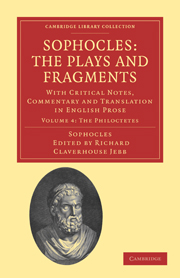APPENDIX
Published online by Cambridge University Press: 05 October 2010
Summary
2 ἄστιπτος. The forms ἄστειπτος and στειπτός are recommended by the general rule that, when the vowel of a verbal stem becomes a diphthong in the present stem, the diphthong is retained in the verbal adjectives (λείπω, ἀδιάλειπτος: ἀλείφω, ἀλειπτός: φείδομαι, φειστέον, etc.). Yet πείθω, while it gives πειστέον, also furnishes πειστός: and ἄπιστος is sometimes found corrupted to ἄπειστος. On the whole, then, I follow L, the oldest and best ms., in reading ἄστιπτος. On though the point is one which can hardly be decided without epigraphic evidence.—The forms ἀστιβής, ἐστίβητος are irrelevant, as coming from στιβέω. Nor can στιπτός and ἄστιπτος be safely referred to the very doubtful form στίβω which Kühner recognises in Xen. An. 1. 9 § 13 (στιβομένας ὁδούς: rather read στειβομένας).
22 f.
ἃ μοι προσελθὼν σῖγα σήμαινʾ εἴτʾ ἔχει
χῶρον *τὸν αὐτὸν τόνδʾ <ἔτʾ>, εἴτʾ ἄλλῃ κυρεῖ.
(1) As has been stated in the commentary, I believe the words σήμαινʾ εἴτʾ ἔχει to be sound, although they violate the metrical rule, according to which the syllable preceding εἴτʾ ought to be short. The rule is that, if there is a caesura in the fifth foot, that foot must be an iambus; unless the second syllable of the fifth foot is either (a) an enclitic, like τοι, or (b) a word which cannot stand first in a sentence, like γάρ.
- Type
- Chapter
- Information
- Sophocles: The Plays and FragmentsWith Critical Notes, Commentary and Translation in English Prose, pp. 229 - 254Publisher: Cambridge University PressPrint publication year: 2010First published in: 1890



